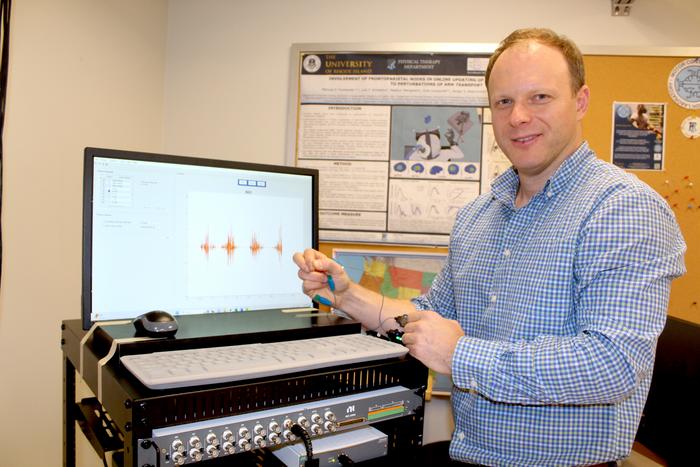Every year, about 800,000 new stroke cases are reported in the United States, often causing patients problems with both neurological and physical motor control. Disruptions in the mobility of the arms and hands, in particular, can have devastating impacts on stroke patients’ quality of life.

Credit: Patrick Luce
Every year, about 800,000 new stroke cases are reported in the United States, often causing patients problems with both neurological and physical motor control. Disruptions in the mobility of the arms and hands, in particular, can have devastating impacts on stroke patients’ quality of life.
The restoration of arm extremity and hand dexterity are often the highest priority among stroke patients. A new robotic platform developed at the University of Rhode Island, which utilizes both a patient’s brainwaves and muscle activity, aims to help post-stroke patients perform needed rehabilitation and regain critical motor skills, including complex tasks like reaching and grasping for an object.
Mariusz Furmanek, assistant professor of physical therapy and PI of the URI Motor Control and Rehabilitation Lab, is working with engineering professors Reza Abiri and Yalda Shahriari on the assistive planar robot, which includes a cutting-edge closed-loop feedback system to monitor the muscle and brain activity of the user in order to trigger the execution of reach and grab in an adaptive way.
“Numerous rehabilitation approaches such as muscular electrical stimulations, brain-computer interfaces, and transcranial magnetic stimulation have been investigated to assist the affected individuals. Only sparse research has been conducted to show the efficacy of assistive planar robots in offering affordable independent solutions to address this demand,” the researchers write in a study summary, which is supported by a $460,000 award from the National Science Foundation’s Disability and Rehabilitation Engineering program. “Designing and developing such robots with satisfactory rehabilitative outcomes could be crucial for high demand tasks such as repetitive motor training as intervention in the early stage of stroke.”
The project, which aims to make significant strides in rehabilitation methodologies, will advance the rehabilitation of upper-extremity motor functions for post-stroke patients. User-generated feedback will tailor the device to each user. The use for post-stroke patients could be immediate. Users will be able to more quickly recover neural plasticity, improving their brain capacity to continue growing and evolving, adapting and changing through the creation of new neurons and networks. The user-centered robotic device can also provide occupational therapy in the patient’s own home. Having a device at home, outside of the clinical setting, would mean more integration into daily life and more physical therapy for patients.
“Through cutting-edge technology, we envision a transformative impact on the rehabilitation journey for post-stroke individuals,” Furmanek said. “The project focuses on developing a user-friendly wearable exoskeleton for adaptive assistance. Through a portable robotic training platform, we aim to overcome barriers, accelerate recovery, and advance the understanding of poststroke upper arm extremity rehabilitation.”
The researchers are also working with and consulting with stroke specialist and Massachusetts General Hospital neurologist David Lin. In the future, the technology could be used for patients with other categories or neurological diseases.
“Despite technological advancements, the intricate nature of the brain poses a significant challenge,” Furmanek said. “Neuroscience remains one of the frontiers due to numerous fundamental questions that await answers.”




